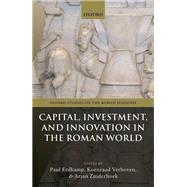Capital, Investment, and Innovation in the Roman World
, by Erdkamp, Paul; Verboven, Koenraad; Zuiderhoek, Arjan- ISBN: 9780198841845 | 0198841841
- Cover: Hardcover
- Copyright: 3/18/2020
Paul Erdkamp, Professor of Ancient History, Vrije Universiteit Brussel,Koenraad Verboven, Professor of Ancient History, Ghent University,Arjan Zuiderhoek, Professor of Ancient History, Ghent University
Paul Erdkamp is Professor of Ancient History at the Vrije Universiteit Brussel, where he has taught since 2007. He studied history at the Radboud University of Nijmegen, obtaining his PhD in 1998, before holding teaching posts at the universities of Edinburgh, Utrecht, and Nijmegen and a research fellowship at Leiden University. He is co-director with Koenraad Verboven of the Roman Society Research Centre (Ghent/Brussels) and general editor of the Palgrave Studies in Ancient Economies series, and has published widely on the Roman economy, the Roman army, and Roman Republican historiography.
Koenraad Verboven is Professor of Ancient History at Ghent University, where he has taught since 2007. He specializes in ancient social and economic history, particularly of the Roman world, and has a special interest in monetary history and numismatics, friendship and patronage based networks, guilds (collegia), (neo-)institutional analysis, and complexity economics. He is the author of The Economy of Friends: Economic Aspects of Amicitia and Patronage in the Late Republic (Peeters, 2002), for which he was awarded the 'Prix Joseph Gantrelle' of the Belgian Royal Academy.
Arjan Zuiderhoek is Professor of Ancient History at Ghent University, where he has taught since 2008. He studied Greek and Roman history at the University of Groningen and the University of Cambridge and obtained his PhD at the University of Groningen in 2006 before taking up positions as Junior Research Fellow and Director of Studies in Classics at Homerton College, University of Cambridge and, subsequently, Postdoctoral Research Fellow at Ghent University. He is the author of The Politics of Munificence in the Roman Empire: Citizens, Elites and Benefactors in Asia Minor (CUP, 2009) and The Ancient City (CUP, 2017).
Frontmatter
List of Figures
List of Tables
List of Abbreviations
List of Contributors
1. Introduction, Paul Erdkamp, Koenraad Verboven, and Arjan Zuiderhoek
I. Investment and Innovation
2. Population, Technology, and Economic Growth in the Roman World, Paul Erdkamp
3. Innovations and Uses of Wealth in Archaic Rome and Latium (Late Eighth to Early Fourth Century BC), Cristiano Viglietti
4. Capital Goods in the Roman Economy, Wim Broekaert and Arjan Zuiderhoek
5. Roman Water-Power: Chronological Trends and Geographical Spread, Andrew Wilson
6. The Archaeological Perception of Capital and its Transformations in Urban Occupations, Nicolas Monteix
II. Capital and Investment in the Rural Economy
7. Funding Irrigation: Between Individual and Collective Investments, Marguerite Ronin
8. Impensae, operae, and the pastio uillatica: The Evaluation of New Venture Investments in the Roman Agricultural Treatises, Mick Stringer
9. A Story of Land and Water: Control, Capital, and Investment in Large-Scale Fishing and Fish-Salting Operations, Annalisa Marzano
10. Invention, Tinkering, or Transfer? Innovation in Oil and Wine Presses in the Roman Empire, Tamara Lewit
III. Human Capital, Financial Capital, and Credit Markets
11. Labouring for God: The Clergy and Human Capital in the Later Roman Empire, Norman Underwood
12. Capital Markets and Financial Entrepreneurs in the Roman World, Koenraad Verboven
13. Capital and Investment in the Campanian Tablets, Jean Andreau
14. Credit and Financial Capital in Roman Egypt, Merav Haklai
15. Temples and Traders in Palmyra, Leonardo Gregoratti
Endmatter
Index
The New copy of this book will include any supplemental materials advertised. Please check the title of the book to determine if it should include any access cards, study guides, lab manuals, CDs, etc.
The Used, Rental and eBook copies of this book are not guaranteed to include any supplemental materials. Typically, only the book itself is included. This is true even if the title states it includes any access cards, study guides, lab manuals, CDs, etc.
Digital License
You are licensing a digital product for a set duration. Durations are set forth in the product description, with "Lifetime" typically meaning five (5) years of online access and permanent download to a supported device. All licenses are non-transferable.
More details can be found here.






